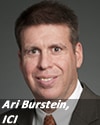A "healthy deterrent" is needed to discourage high-frequency trading firms from cluttering the market with thousands of orders that are never executed, Investment Company Institute's Ari Burstein told TradeTech's HFT Focus Day in London yesterday.
Burstein, the US buy-side trade body's senior counsel for capital markets, called on regulators to introduce cancellation fees as traders who cancelled up to 99% of their orders created noise in the marketplace.
"Large amounts of small orders that are being cancelled almost immediately in the second they are put in don't necessarily help us get our large orders done," he said.
"It's a lot of volume that is being put in to the marketplace, not necessarily a lot of liquidity. It's very confusing as to what the true bids and offers are."
Burstein wouldn't speculate on what the cancellation ratio should be for the fee - 80, 90 or 95% – but said it shouldn't be upwards of 99% as some US exchanges had tried to implement in the past.
"When I talk about fees, I'm talking about a truly meaningful fee and deterrent to cancel orders," Burstein said.
Exchange operators Direct Edge and Nasdaq OMX introduced a small fee in May 2012. Nasdaq's penalised firms at least half a penny if they submitted 100,000 orders or more a day, but only executed less than one per cent. While Direct Edge cut paybacks by 1% per 100 shares traded to firms that sent excessive quotes. Both Nasdaq and Direct Edge's initiative failed to deter large order cancellations.
Burstein said HFT firms have argued that they are the new market makers, and cancellations were in fact updated quotes, but that didn't stick. "I think our response would be that some of these firms are not regulated as market makers," he said. "If you are regulated and registered as a market maker, then you should be able to do your job, which means updating your quotes." Burstein has suggested a possible market maker exemption if regulators do introduce a cancellation penalty.
He said the buy-side was also worried about manipulative and abusive practices. Regulators haven't been able to keep up with the technological advancements of the marketplace, and there was certainly concern about their lack of understanding, Burstein said.
"The regulators need to have access to accurate, timely and detailed information. They need to have a smart reporting regime and the ability to analyse order books."
As to whether a major market restructure was realistic, Burstein said it was necessary despite not being too favourable for some.
"It's not in the best of interest of all. The regulators do need to step in and take a role in market structure." He said it wasn't sufficient for investors to leave matters of market structure to the sell-side and regulators – the buy-side also had to take responsibility for their orders. "I think you can already see that. The buy-side is trading smarter. They are embracing the technology, using the tools and asking tougher questions of order routing execution."
Overall, Burstein said ICI was encouraged by the benefits and advancements that the current market structure has brought.
"In general, we believe that investors are better off than they were even just a fewer years ago," he said. "You have lower cost, you have more technology at our fingertips and more trading tools that we can use.
